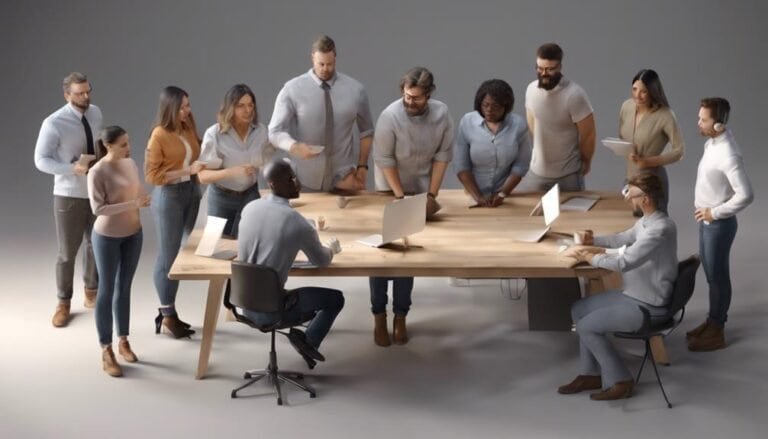Resume Building and Interview Skills for Graduating Students
Like a key that unlocks the door to your future, a strong resume and polished interview skills are essential for graduating students. They are the tools that will help you stand out in a sea of applicants and make a lasting impression on potential employers.
But where do you start? How do you create a resume that grabs attention and prepare for an interview that leaves a lasting impact?
In this discussion, we will explore the art of resume building and interview skills, unraveling the secrets that will set you apart from the competition and pave the way for your professional success.
So, are you ready to unlock your potential and embark on a journey towards career success?
Key Takeaways
- Tailoring your resume to the job is crucial for standing out and showcasing relevant skills and experience. Utilizing a resume builder can streamline this process, ensuring that each application you submit is perfectly aligned with the job requirements.
- Crafting a compelling cover letter that is personalized to each specific job application can greatly increase your chances of getting noticed by employers.
- Researching the company and preparing for interviews by visiting their website, checking social media profiles, and networking with current or former employees can help you make a great impression.
- Maintaining good eye contact, using appropriate gestures, and being mindful of tone and pace of speech during interviews can help you effectively communicate your skills and qualifications.
Importance of a Strong Resume
Having a strong resume is crucial for graduating students as it serves as a first impression and a powerful tool to showcase your skills, experiences, and qualifications to potential employers.
In today’s competitive job market, it’s essential to tailor your resume to each specific job application. This means carefully analyzing the job description and highlighting relevant skills and experiences that align with the requirements of the position. By tailoring your resume, you demonstrate your attention to detail and show employers that you’re genuinely interested in the role.
Additionally, incorporating resume keywords is vital to catching the attention of hiring managers and applicant tracking systems (ATS). Many companies now use ATS to scan resumes and filter out candidates who don’t meet the specified criteria. To increase your chances of getting noticed, it’s vital to include industry-specific keywords in your resume. These keywords can be found in the job description itself or by researching common terms and phrases used in the field. By strategically incorporating these keywords, you improve your resume’s chances of passing through the initial screening process and reaching the hands of the hiring manager.
Tailoring Your Resume to the Job
To effectively tailor your resume to a specific job, analyze the requirements and incorporate relevant skills and experiences that align with the position, showcasing your attention to detail and genuine interest in the role. Taking a personalized approach to your resume can greatly increase your chances of standing out from the competition.
Start by carefully reading the job description and highlighting the key skills and qualifications the employer is seeking. Then, review your own experiences and identify those that closely match what the employer is looking for.
When customizing your resume, remember to use targeted content that directly addresses the specific needs of the employer. This means emphasizing your relevant accomplishments, skills, and experiences in a way that aligns with the job requirements. Use action verbs and quantifiable achievements to demonstrate your abilities and make a strong impact.
In addition to aligning your skills and experiences, it’s important to showcase your genuine interest in the role. This can be done by including a well-crafted objective or summary statement that highlights your passion for the industry and the specific position. Furthermore, you can tailor your resume even further by researching the company and incorporating any relevant information or achievements that demonstrate your knowledge and enthusiasm.
Highlighting Relevant Skills and Experience
When it comes to creating a standout resume, it’s essential to highlight your key skills and relevant experience. Employers want to see that you have the qualifications they’re looking for, so be sure to showcase those skills prominently on your resume.
Key Skills and Experience
Highlighting your relevant skills and experience is crucial when creating a standout resume that catches the attention of potential employers. Here are four key skills and experiences that you should consider including:
- Technical skills: Showcase your proficiency in specific software, programming languages, or tools that are relevant to the job you’re applying for. This demonstrates your ability to handle specific tasks and shows that you’re up-to-date with industry trends.
- Leadership experience: Highlight any previous roles where you were responsible for leading a team or managing projects. This demonstrates your ability to take charge, make decisions, and effectively communicate with others.
- Problem-solving skills: Employers value candidates who can think critically and find innovative solutions to challenges. Highlight any instances where you successfully resolved a problem or implemented a solution that had a positive impact.
- Communication skills: Strong communication skills are essential in almost every job. Highlight any experiences where you effectively communicated ideas, collaborated with others, or presented information in a clear and concise manner.
Showcasing Relevant Qualifications
To effectively showcase your relevant qualifications, focus on highlighting your key skills and experiences that align with the requirements of the job you are applying for. Employers want to see tangible evidence of your capabilities, so it’s crucial to showcase your accomplishments and certifications that are directly relevant to the position.
Here’s a helpful table to organize and present your qualifications in a clear and concise manner:
| Qualification | Skills | Experience |
|---|---|---|
| Skills | Experience | |
| – Excellent communication skills | – Internship at XYZ Company | |
| – Strong problem-solving abilities | – Leadership role in student organization | |
| – Proficient in Microsoft Office Suite | – Volunteer work at local non-profit |
Crafting a Compelling Cover Letter
Craft a cover letter that captivates employers by showcasing your unique qualifications and highlighting your enthusiasm for the position. A compelling cover letter is your opportunity to make a strong first impression and stand out from other applicants. To craft a cover letter that grabs attention, consider these four key strategies:
- Personalize the letter: Tailor your cover letter to each specific job application. Research the company and job requirements to understand their needs and values. Incorporate this knowledge into your letter by mentioning specific skills or experiences that align with the company’s goals.
- Use effective communication: Write in a clear, concise, and professional manner. Make sure your letter is well-structured, with an introduction, body paragraphs, and a strong conclusion. Use active voice and action verbs to convey confidence and energy. Avoid using jargon or overly technical language that may confuse the reader.
- Highlight your achievements: Instead of simply restating your resume, focus on highlighting your most relevant accomplishments and how they demonstrate your qualifications for the position. Use specific examples and metrics to quantify your achievements and show the impact you made in previous roles.
- Convey enthusiasm: Show your genuine interest and passion for the job. Explain why you’re excited about the opportunity and how your skills and experiences align with the company’s mission. Let your enthusiasm shine through your words to leave a lasting impression on the employer.
Researching the Company and Interview Preparation
Now that you have crafted a compelling cover letter, it’s time to take the next step in your job search by thoroughly researching the company and preparing for the interview. Researching the company before an interview is crucial as it shows your interest and helps you tailor your answers to align with the company’s values and goals. Here are some researching techniques to help you prepare:
| Researching Techniques | Interview Etiquette |
|---|---|
| Visit the company’s website | Dress professionally |
| Look for recent news articles or press releases | Arrive on time or early |
| Check the company’s social media profiles | Bring extra copies of your resume |
| Read reviews or testimonials from current or former employees | Prepare questions to ask the interviewer |
| Network with current or former employees | Maintain eye contact and a positive attitude |
Common Interview Questions and How to Answer Them
Now that you’ve prepared for your interview by researching the company, it’s time to tackle the common interview questions that you’re likely to encounter.
These questions are designed to assess your skills, experience, and fit for the role, so it’s important to come up with effective answers that showcase your qualifications.
Key Interview Questions
Preparing for an interview can be both exciting and nerve-wracking, but by familiarizing yourself with common interview questions and crafting thoughtful responses, you can confidently navigate any interview situation.
Here are four key interview questions that you should be prepared to answer:
- ‘Tell me about yourself’: This question provides an opportunity for you to give a brief overview of your background, highlighting key experiences and skills that are relevant to the job you’re applying for.
- ‘Why do you want to work for this company?’: To answer this question effectively, research the company beforehand and identify specific aspects that appeal to you. Focus on how your values align with the company’s mission and vision.
- ‘Describe a challenge you faced and how you overcame it’: This question assesses your problem-solving skills and resilience. Choose a relevant example and emphasize the steps you took to overcome the challenge, highlighting the positive outcome.
- ‘Where do you see yourself in five years?’: This question evaluates your long-term goals and ambitions. Be honest and align your response with the career path and growth opportunities offered by the company.
Effective Answers Techniques
Crafting effective answers to common interview questions is essential for graduating students who want to confidently navigate the interview process and increase their chances of securing their desired job. To effectively communicate your skills and qualifications during an interview, it is crucial to not only focus on what you say but also on your body language. Employers pay attention to how you present yourself as it can convey confidence, professionalism, and enthusiasm. By maintaining good eye contact, sitting up straight, and using appropriate gestures, you can demonstrate your confidence and engagement. Additionally, be mindful of your tone and pace of speech to ensure effective communication. The table below provides examples of common interview questions and suggested answers to help you prepare for your next interview:
| Common Interview Question | Suggested Answer |
|---|---|
| “Tell me about yourself.” | Start with a brief overview of your background, education, and relevant experience. Highlight your key skills and accomplishments. |
| “Why do you want to work for our company?” | Research the company beforehand and mention specific aspects that align with your values and career goals. Emphasize your enthusiasm for the company’s mission and culture. |
| “Can you describe a time when you faced a challenge and how you overcame it?” | Share a specific example of a challenge you encountered, explain the steps you took to address it, and highlight the positive outcome or lesson learned. |
Showcasing Your Soft Skills in an Interview
During an interview, effectively highlighting your soft skills can greatly enhance your chances of landing the job. While technical expertise is important, employers also value candidates who possess strong communication skills and problem-solving abilities. Here are four ways to showcase your soft skills in an interview:
- Provide specific examples: When discussing your communication skills, share instances where you effectively communicated with team members or resolved conflicts through clear and concise communication. This demonstrates your ability to articulate ideas and collaborate effectively.
- Highlight your problem-solving abilities: Share stories where you identified a problem, developed a solution, and successfully implemented it. Emphasize your critical thinking skills, creativity, and ability to adapt in challenging situations.
- Show your emotional intelligence: Employers value individuals who can manage their own emotions and navigate relationships with others. Talk about instances where you demonstrated empathy, active listening, and the ability to work well in a team.
- Discuss your leadership experiences: Even if you’re not applying for a managerial role, showcasing your leadership skills can be beneficial. Share examples where you took the initiative, motivated others, and successfully led a project or team.
Building a Professional Online Presence
To establish yourself as a professional in today’s digital age, it’s essential to curate a strong online presence that showcases your skills and expertise. Online networking has become a powerful tool for connecting with professionals in your field, expanding your network, and staying up-to-date with industry trends. Platforms like LinkedIn and Twitter can be utilized to build relationships, share valuable content, and engage in conversations that demonstrate your knowledge and passion.
In addition to online networking, creating an online portfolio is a great way to showcase your work and highlight your accomplishments. Whether you’re a writer, designer, or programmer, having a collection of your best projects readily available online can leave a lasting impression on potential employers. Consider creating a personal website or using platforms like Behance or GitHub to showcase your work.
Following Up After the Interview
Now that you have established a strong online presence, it’s time to take the next step and ensure you leave a lasting impression by following up after the interview. Sending a follow-up email or a thank you note is a simple yet effective way to show your appreciation and reaffirm your interest in the position.
Here are four reasons why following up is crucial:
- Demonstrates professionalism: By sending a follow-up email or thank you note, you show that you’re proactive, courteous, and grateful for the opportunity. It leaves a positive impression on the interviewer and sets you apart from other candidates.
- Reinforces your qualifications: Following up allows you to reiterate your key qualifications and highlight any points you may have missed during the interview. It gives you an opportunity to emphasize why you’re the best fit for the role.
- Builds rapport: A follow-up email or thank you note gives you another chance to connect with the interviewer on a personal level. It shows that you value their time and reinforces the positive connection you established during the interview.
- Keeps you on their radar: Following up ensures that you stay on the interviewer’s radar even after the interview is over. It keeps your name fresh in their mind and increases the chances of receiving feedback or being considered for future opportunities.
Conclusion
In conclusion, mastering the art of resume building and interview skills is crucial for graduating students.
A strong resume tailored to the job, highlighting relevant skills and experience, can make a lasting impression on potential employers.
Crafting a compelling cover letter and showcasing soft skills in an interview further enhance your chances of success.
Remember, just like a well-tailored suit or a beautifully arranged bouquet, a well-crafted resume and polished interview skills can be the key to unlocking countless opportunities in your career.







